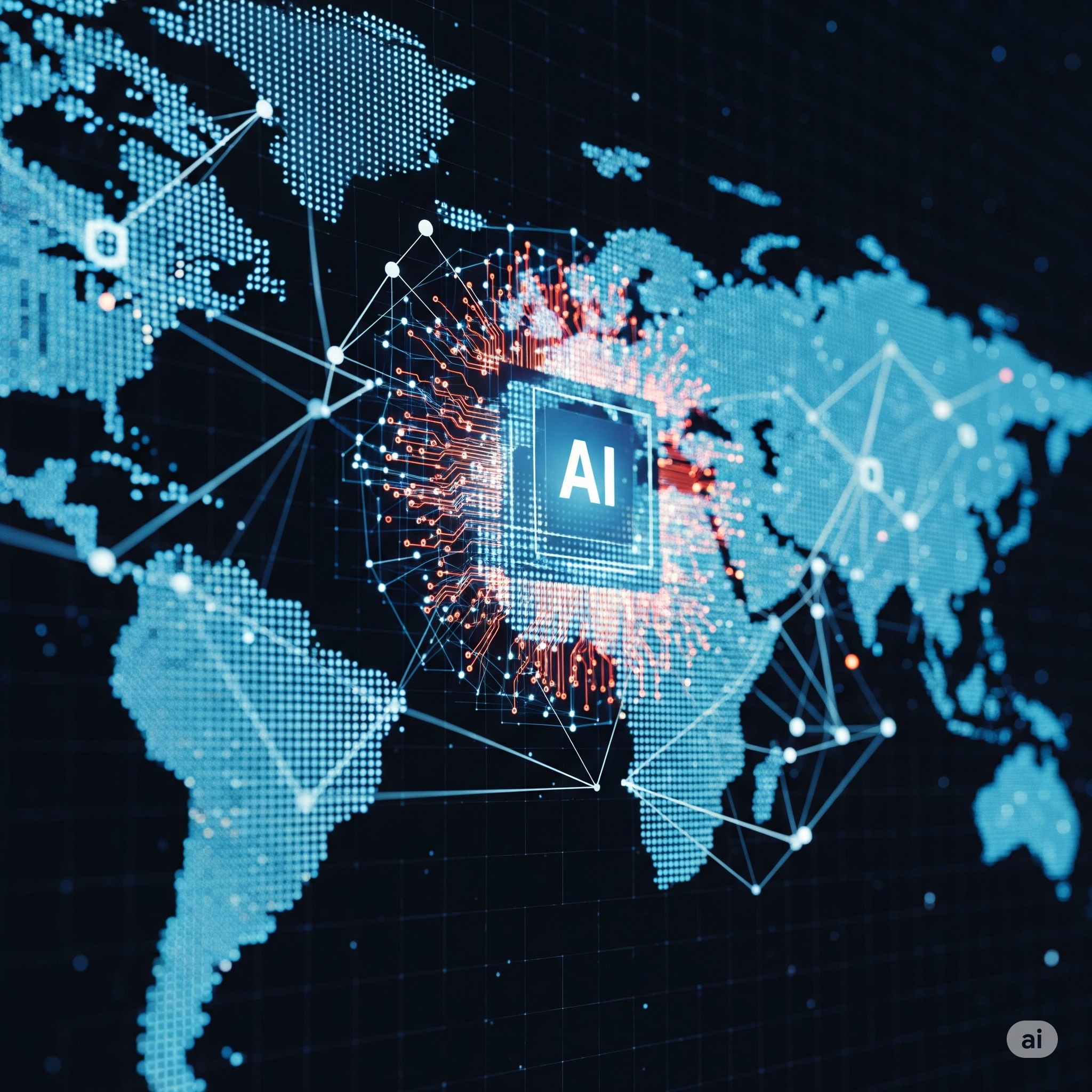In today’s interconnected and increasingly complex global marketplace, a robust and efficient supply chain is the backbone of any successful business. However, managing the intricate network of suppliers, manufacturers, distributors, and retailers can be a daunting task, often plagued by inefficiencies, bottlenecks, and unforeseen disruptions. Enter AI supply chain optimization, a transformative force that leverages the power of artificial intelligence to analyze vast amounts of data, identify hidden patterns, and predict future challenges with remarkable accuracy. For businesses striving for agility, resilience, and cost-effectiveness, mastering AI supply chain optimization and understanding the crucial role of AI for logistics are no longer optional but essential strategies for gaining a competitive edge and ensuring seamless operations.
The integration of artificial intelligence into supply chain management is revolutionizing how goods and services are produced, transported, and delivered. AI for logistics encompasses a wide range of applications, from predicting demand fluctuations and optimizing inventory levels to streamlining transportation routes and enhancing warehouse management. By employing sophisticated machine learning algorithms, businesses can gain unprecedented visibility into their supply chains, proactively mitigate risks, and make data-driven decisions that lead to significant improvements in efficiency, cost reduction, and customer satisfaction. This article will delve into the transformative potential of AI supply chain optimization, its diverse applications across the logistics and operations landscape, the tangible benefits it offers, essential tools, and how organizations can effectively implement this intelligent technology to build a supercharged and future-proof supply chain.
The Evolution of Supply Chain Management: Embracing AI for Enhanced Efficiency
Traditional supply chain management often relies on manual processes, siloed data, and reactive problem-solving. While established methodologies have served businesses for decades, they often lack the agility and predictive capabilities needed to thrive in today’s dynamic environment. AI supply chain optimization represents a paradigm shift, offering the ability to analyze vast and diverse datasets in real-time, identify intricate relationships, and forecast potential disruptions before they even occur.
By applying techniques like machine learning, natural language processing (NLP), and computer vision, AI can analyze everything from historical sales data and supplier performance to weather patterns and geopolitical events to provide a more holistic and forward-looking view of the entire supply chain. This proactive and data-driven approach, fueled by AI for logistics and operations, allows businesses to anticipate demand more accurately, optimize inventory levels dynamically, and make smarter decisions regarding sourcing, manufacturing, and distribution. The integration of AI is not about replacing human expertise but about augmenting it with powerful analytical capabilities to create truly intelligent and resilient supply chains.
AI: A Catalyst for Efficiency Across Industries, Including Logistics and Operations
The transformative impact of AI extends far beyond supply chain optimization, driving efficiency gains across a multitude of industries. In manufacturing, AI-powered robots and predictive maintenance systems are increasing production speed, improving quality control, and reducing downtime, as highlighted in reports on Industry 4.0 advancements.
In the transportation sector, AI is being used to optimize routing for delivery services, manage autonomous vehicles, and improve traffic flow, leading to reduced fuel consumption and faster delivery times. For customer service, AI-powered chatbots can handle routine inquiries, track shipments, and provide real-time updates, enhancing customer satisfaction and freeing up human agents for more complex issues, a trend discussed on the Zendesk Blog. Even in agriculture, AI is being used for precision farming, optimizing resource utilization and improving crop yields. These examples underscore the broad applicability of AI in streamlining operations and enhancing efficiency across various sectors, making it an invaluable asset for businesses seeking to optimize their logistics and supply chain through AI supply chain optimization.
Real-World Impact: AI Supercharging Supply Chains Globally
The practical applications of AI supply chain optimization are delivering significant results for businesses worldwide. Here are two compelling real-world examples:
Scenario 1: Demand Forecasting and Inventory Optimization in Retail
A major global retailer implemented an AI supply chain optimization platform to improve the accuracy of its demand forecasting and optimize inventory levels across its vast network of stores and warehouses. The AI analyzed historical sales data, seasonality, promotions, weather patterns, and social media trends to predict consumer demand with greater precision.
The Result: The retailer achieved a significant reduction in both stockouts and excess inventory, leading to increased sales, reduced holding costs, and improved customer satisfaction. The AI for logistics capabilities enabled more efficient distribution and replenishment processes, demonstrating the tangible financial and operational benefits of AI in supply chain management.
AI vs Human Writing: Who Wins in 2025?
Scenario 2: Predictive Maintenance and Reduced Downtime in Manufacturing
A large manufacturing company integrated AI supply chain optimization with its production systems to implement predictive maintenance on its critical machinery. AI algorithms analyzed sensor data from the equipment to identify patterns indicative of potential failures.
The Result: The company was able to proactively schedule maintenance, preventing unexpected breakdowns and significantly reducing production downtime. This resulted in increased output, lower maintenance costs, and improved overall equipment effectiveness, showcasing how AI supply chain optimization extends beyond logistics to enhance operational efficiency.
These scenarios illustrate the transformative power of AI in optimizing various aspects of the supply chain, from predicting demand to ensuring operational continuity.
Powering Your Supply Chain: Essential AI Tools and Platforms
Implementing AI supply chain optimization requires leveraging specialized tools and platforms. Here are some examples across different categories, along with how they can empower your logistics and operations:
End-to-End AI Supply Chain Management Platforms:
- SAP Integrated Business Planning (IBP): A cloud-based platform that leverages AI and machine learning for demand planning, inventory optimization, supply planning, and sales and operations planning. Explore its features at SAP.com/products/integrated-business-planning.
- How it helps: Provides a holistic view of the supply chain, enabling data-driven decision-making across all planning horizons with embedded AI capabilities.
- Oracle Supply Chain Management (SCM) Cloud: Offers AI-powered solutions for various aspects of supply chain management, including intelligent order management, logistics, and inventory management. Learn more at Oracle.com/scm.
- How it helps: Provides a comprehensive suite of AI-enhanced applications to optimize different stages of the supply chain, from sourcing to delivery.
- Kinaxis RapidResponse: A cloud-based platform that utilizes AI and advanced analytics for concurrent planning across the supply chain, enabling rapid response to disruptions and changes in demand. Discover its capabilities at Kinaxis.com.
- How it helps: Offers real-time visibility and AI-powered insights to improve agility and resilience in the face of supply chain variability.
Specialized AI Tools for Logistics and Operations:
- project44: A leading visibility platform that uses AI and machine learning to provide real-time tracking and predictive ETAs for shipments across various transportation modes. Visit project44.com.
- How it helps: Enhances transparency and allows for proactive management of transportation logistics, improving on-time delivery and customer satisfaction.
- Locus Robotics: Offers autonomous mobile robots (AMRs) for warehouse automation, utilizing AI for intelligent order fulfillment and improved warehouse efficiency. Explore their solutions at LocusRobotics.com.
- How it helps: Automates warehouse tasks, reduces labor costs, and improves order accuracy and speed through AI-powered robotics.
- Blue Yonder (formerly JDA Software): Provides AI-powered solutions for supply chain planning, execution, and workforce management, optimizing various aspects of logistics and operations. Learn more at BlueYonder.com.
- How it helps: Offers a broad range of AI-driven tools to optimize everything from demand forecasting to warehouse labor management.
Cloud-Based AI Platforms for Custom Supply Chain Model Development:
- Google Cloud Supply Chain Twin: A solution built on Google Cloud that allows businesses to create a digital representation of their supply chain and leverage AI for optimization and resilience. Discover it at cloud.google.com/solutions/supply-chain/twin.
- How it helps: Provides a flexible platform for building custom AI supply chain optimization models tailored to specific business needs.
- Microsoft Azure Supply Chain Center: Offers a suite of Azure services and AI capabilities to build intelligent and resilient supply chain solutions. Explore its features at azure.microsoft.com/en-us/solutions/supply-chain.
- How it helps: Enables businesses to leverage Microsoft’s AI infrastructure to build and deploy sophisticated AI for logistics and operations solutions.
- AWS Supply Chain: A suite of cloud-based services that uses AI and machine learning to provide enhanced visibility, accurate demand forecasting, and optimized planning across the supply chain. Learn more at aws.amazon.com/supply-chain.
- How it helps: Offers a range of AI-powered services designed to improve agility, efficiency, and resilience in supply chain management.
Practical Tips and Beginner-Friendly Workflows for AI Supply Chain Optimization:
- Identify Key Pain Points: Start by pinpointing the most significant challenges and inefficiencies in your current supply chain.
- Focus on Data Integration: Ensure that data from all relevant systems (ERP, TMS, WMS, etc.) is integrated and accessible for AI analysis.
- Begin with Pilot Projects: Implement AI for specific, well-defined use cases (e.g., demand forecasting for a specific product line) before scaling across the entire supply chain.
- Choose User-Friendly Platforms: Opt for AI-powered supply chain management tools that offer intuitive interfaces and require minimal coding for initial implementation.
- Collaborate with Experts: Engage with data scientists and supply chain consultants to guide your AI implementation strategy.
- Measure and Iterate: Continuously track the performance of your AI-powered solutions and make adjustments as needed to optimize results.
- Focus on Explainable AI: Understand the insights and recommendations provided by AI algorithms to build trust and ensure informed decision-making.
Case Studies: Businesses Thriving with AI-Powered Supply Chains
Case Study 1: “Global Electronics Manufacturer,” Enhancing Supply Chain Resilience
A global electronics manufacturer implemented an AI supply chain optimization platform to enhance the resilience of its supply chain against disruptions. The AI analyzed various risk factors, including supplier vulnerabilities, geopolitical events, and transportation delays.
The Result: The AI system provided early warnings of potential disruptions, allowing the manufacturer to proactively adjust sourcing strategies, secure alternative suppliers, and minimize the impact of unforeseen events on its production schedule.
Case Study 2: “Regional Food Distributor,” Optimizing Delivery Routes and Reducing Waste
A regional food distributor leveraged AI for logistics to optimize its delivery routes and reduce food waste. AI algorithms analyzed delivery schedules, traffic patterns, and product shelf life to create more efficient routes and minimize spoilage.
The Result: The distributor achieved significant reductions in fuel costs, delivery times, and food waste, leading to improved profitability and a more sustainable operation.
The Dawn of the Intelligent Supply Chain
AI supply chain optimization is no longer a futuristic concept but a present-day reality that is revolutionizing how businesses manage their complex networks. By harnessing the analytical and predictive power of artificial intelligence, organizations can achieve unprecedented levels of efficiency, resilience, and agility in their logistics and operations. From more accurate demand forecasting and optimized inventory management to streamlined transportation and proactive risk mitigation, the benefits of AI for logistics are substantial and continue to grow. As AI technology advances, its role in supercharging supply chains will only become more critical, paving the way for a future where intelligent, data-driven decision-making ensures seamless flow of goods and services across the globe.
AI for Creative Writing: From Draft to Masterpiece
AI in Contract Review: Speeding Up Due Diligence and Compliance



